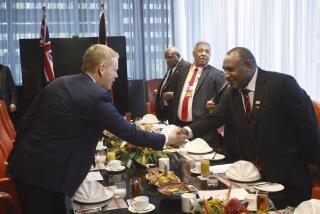U.S.-China Nuclear Pact ‘Vague, Unclear’--GAO
- Share via
WASHINGTON — The General Accounting Office says the U.S.-China nuclear agreement contains “vague and unclear language” that could lead to future misunderstandings with the Chinese over the use of American-supplied atomic materials.
But it said the problems are not serious enough to warrant rejecting the accord, which provides the framework for future sales of nuclear reactors and other nuclear equipment to the Chinese.
The report by the congressional watchdog agency was prepared for Sen. John Glenn (D-Ohio), who has unsuccessfully sought to write major revisions into the agreement.
Not Made Public
The report was dated Nov. 27, but made public only over the weekend.
The agreement, first initialed during President Reagan’s trip to China in 1984, took effect Dec. 11.
Glenn has challenged the agreement on grounds that it does not contain explicit safeguards to prevent China from using U.S. materials for nuclear weapons or from supplying the material to other nations for weapons development. The Administration contends that the safeguards are adequate and has opposed Glenn’s efforts to revise the agreement.
The GAO generally supported the senator’s reservations, although it said overall that “we found nothing in the agreement which would preclude congressional approval.”
The agency said it was unable to explore “the continuing allegations” that China has exported nuclear weapons technology to other countries because “the CIA denied our request for relevant intelligence information.”
‘Right of Every Nation’
It noted that before 1984, the Chinese “espoused the right of every nation to develop nuclear capabilities in order to break the superpowers’ ‘monopoly’ of nuclear weapons.”
Of the agreement itself, the GAO said it “does contain certain vague and unclear language which could lead to misinterpretation,” and that in several instances, the language differs from nuclear cooperation agreements worked out with other nations.
While the differences are not in themselves of great importance, they do “represent a departure from the longstanding U.S. practice of encouraging more stringent controls on the use of U.S. nuclear exports,” the report said.
More to Read
Sign up for Essential California
The most important California stories and recommendations in your inbox every morning.
You may occasionally receive promotional content from the Los Angeles Times.













